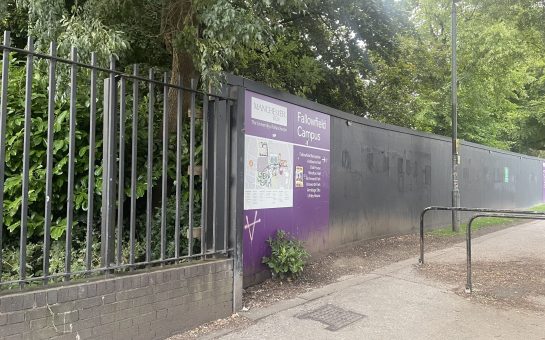In September 2015, The Independent devoted their front page to three-year-old Aylan Kurdi – a Syrian refugee, whose dead body was washed ashore in Turkey after his boat capsized before it could reach the safety of Kos.
The image went viral. Angela Merkel opened Germany’s borders. 1.4 million signatures were presented to David Cameron, calling for refugees to be allowed to seek sanctuary in the UK.
For many of us, the photograph opened our eyes to an international emergency – but for one University of Manchester student, the seriousness of the situation had been evident since civil war broke out in 2011.
Aala El-Khani had already begun her PhD in psychology when news of the unrest started to make headlines.
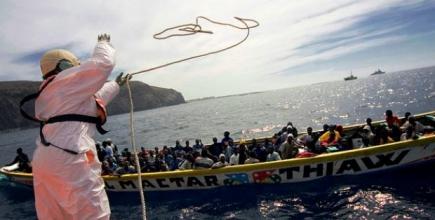
DESPERATE: Many migrants have died trying to reach foreign shores (© A. Rodriguez, UNHCR)
Despite having started researching another topic, Aala couldn’t ignore the humanitarian crisis and made the bold decision to change her research in order to help refugees.
She told MM: “It initially started with my watching the news in the UK and watching the families leaving Syria, being displaced, refugee camps and just thinking, as a mother, if that was me in that situation how would I cope?”
Aala wanted to focus her PhD work on providing emotional and psychological support for parents – an area that she already had some experience in and she felt wasn’t being addressed.
She said: “When there is non-government organisation (NGO) funding the funding will go to primary needs.
“Under primary needs you have food, shelter, safety, physical illnesses – whereas psychological needs are seen as secondary.
“That’s understandable in that situation but when you think about how parents are the first line of defence for those children – when you look at the quality of childcare that children receive from their parents during war and displacement, it can be more significant than the actual events of war itself on a child in the future.
“It really makes you understand that actually the mental health needs of children must also be prioritised as a primary need.”
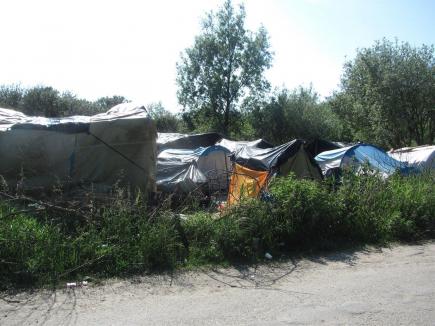
THE JUNGLE: Refugees have gathered in Calais, but conditions are poor (© Michal Bělka, via Wikipedia)
The events she was watching unfold were made even more personal for Aala, as although she was born and raised in London, her parents are Syrian.
She said: “I could relate so well because these were Syrian mothers that I was watching who I knew were fleeing purely because of war not because of a financial situation.
“In theory that could have been me, that could have been some of my relatives.”
It was this personal commitment to her new proposal that made Aala’s supervisor, Professor Rachel Calam, certain that she would be able to undertake the workload that changing a PhD topic involves.
“When somebody wants to make a change to their PhD it will mean, a lot of extra reading, a lot of extra research activity,” she told MM.
“It’s not something to be undertaken lightly and I could see that she was tremendously committed and people always work best on a piece of research that they are very much committed to.
“It felt and still feels an extremely important question, can we help families to help their own children through the experiences of war and conflict and displacement?
“That’s an enormously important question at the moment and it’s become more and more important, so that seemed like a very important area to enable her to work in.”
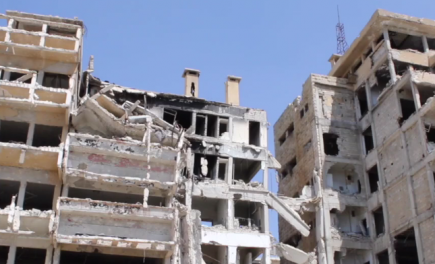
CIVIL WAR: Much of Syria has been left in ruins from the conflict
Having had her decision signed off by Professor Calam, Aala began work by travelling to Syria and Turkey to carry out focus groups and interview families.
Aala said: “The data that we got was so moving. These families were really, really struggling with caring for their children.
“They didn’t know how to answer their children’s questions – that was a really big one for them. Their children were suddenly bed wetting, have night terrors, scared of loud noises and the parents simply didn’t know how to respond to these new things.
“They really did want access to support.
“They made attempts such as going to their local doctor, they’d gone to the teachers in the refugee camp schools – but again because it was such a new situation the teachers were often refugees like them so they couldn’t help either.”
It was through these conversations that Aala noticed just how vital it was that parenting support was provided to refugees.
She said: “Towards the end of the interview I would say ‘thank you for your time, it’s been really useful to hear this’, and they would say ‘no, thank you for giving us the chance to think about parenting. We’ve been in survival mode since leaving Syria; it’s actually nice to reflect on how we used to parent well’.
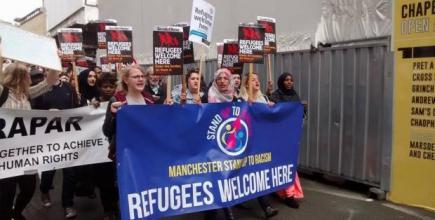
REFUGEES WELCOME: Protestors in Manchester demanded for England to help refugees
“I’d see one of the mothers the next day or the day after and she’d say things to me like ‘that was so useful talking to you. Since then I’ve been more responsive to my daughter, I read her a bedtime story, you know we sang together?’
“That was just by talking about parenting, let alone giving them actual tips and advice and techniques that they could use.”
Having collected her data, Aala went on to put together a leaflet to be distributed to Arabic speaking refugees – no mean feat when you consider that 4.6million Syrians are currently registered as refugees.
However, Aala’s solution to this problem was both simple and effective, as she creatively turned to the cost-effective staple of bread.
She said: “We developed an innovative technique of placing these parenting leaflets inside bread wrappers that were routinely distributed to families living in a conflict zone in Syria.
“We thought bread because everyone, even in the most basic areas, the one thing that they do get almost always is bread.
“These leaflets had information about what you as a parent might be experiencing and how you can help yourself, and then what your child may be experiencing and how you can help your child.
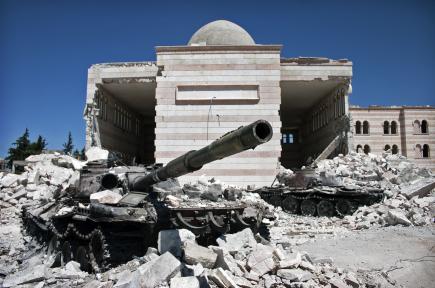
CONFLICT ZONE: Parental advice has been distributed in bread packaging (© Christiaan Triebert, via Flickr)
“It’s really important to normalise families that what they were going through was normal and what their children were experiencing was normal and that there are ways of helping the child.”
The feedback that Aala has received has been encouraging, with families noting that they felt supported as well as commenting that they wanted to know how they could care for their children after they’d lost partners.
In Manchester, Aala has also been working with the team at the Rethink Rebuild Society (RRS), a community organisation which helps Syrians to settle in Britain.
Yasmine Nahlawi, the Advocacy and Policy Co-ordinator at RRS, told MM that they simply don’t have the resources to provide the kind of dedicated psychological support that Aala is pushing for.
She told MM: “It’s something we’d love to do more of.
“When you talk to them you can’t really tell that there’s anything wrong. You don’t talk to them and they’re crying in front of you, but I think a lot of it is hidden.
“When you talk to people and you hear more about their stories that’s when you can begin to understand the issues that they’re going through.”
Yasmine’s hopes of more of this kind of work being done are likely to be realised thanks to Aala.
The leaflet has been translated into multiple languages since the initial distribution and the United Nations Office on Drugs and Crime are currently consulting with her on ways of helping refugees as they move from displacement to resettlement.
For Aala, who proudly graduated last month, the issue remains a ‘human’ one and although the work has been difficult, it’s also been hugely worthwhile.
She said: “A PhD is always going to be tough but I also felt very entrusted. The stories that you hear are hard, and the families that you meet are in really difficult situations.
“One of the families said ‘we’ve told you our story: now share it’.”
And she has been doing just that. One loaf of bread at a time.

